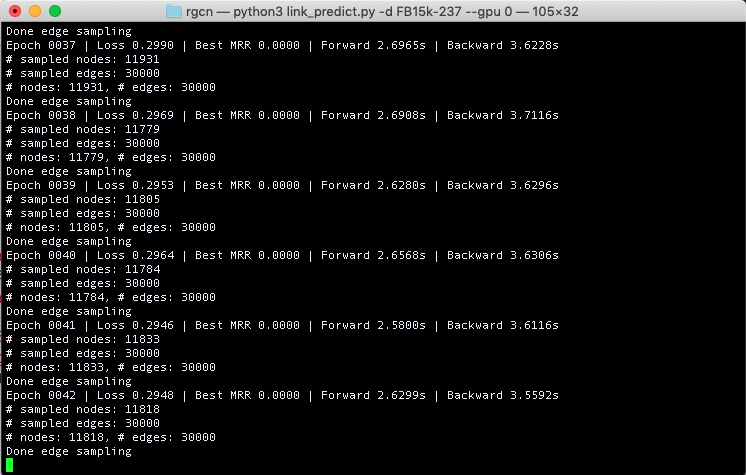Thanks, @lerachel9900! The link prediction example is working now, but got an out of memory error during evaluation:
Epoch 0500 | Loss 0.0971 | Best MRR 0.0000 | Forward 1.9687s | Backward 5.1627s │
start eval │
Traceback (most recent call last): │
File "link_predict.py", line 258, in <module> │
main(args) │
File "link_predict.py", line 188, in main │
embed = model(test_graph, test_node_id, test_rel, test_norm) │
File "/home/vamship/.conda/envs/dgl_sample/lib/python3.7/site-packages/torch/nn/modules/module.py", line 722, in _call_impl │
result = self.forward(*input, **kwargs) │
File "link_predict.py", line 67, in forward │
return self.rgcn.forward(g, h, r, norm) │
File "/home/vamship/dgl/examples/pytorch/rgcn/model.py", line 47, in forward │
h = layer(g, h, r, norm) │
File "/home/vamship/.conda/envs/dgl_sample/lib/python3.7/site-packages/torch/nn/modules/module.py", line 722, in _call_impl │
result = self.forward(*input, **kwargs) │
File "/home/vamship/.conda/envs/dgl_sample/lib/python3.7/site-packages/dgl/nn/pytorch/conv/relgraphconv.py", line 185, in forward │
g.update_all(self.message_func, fn.sum(msg='msg', out='h')) │
File "/home/vamship/.conda/envs/dgl_sample/lib/python3.7/site-packages/dgl/graph.py", line 3238, in update_all │
Runtime.run(prog) │
File "/home/vamship/.conda/envs/dgl_sample/lib/python3.7/site-packages/dgl/runtime/runtime.py", line 11, in run │
exe.run() │
File "/home/vamship/.conda/envs/dgl_sample/lib/python3.7/site-packages/dgl/runtime/ir/executor.py", line 204, in run │
udf_ret = fn_data(src_data, edge_data, dst_data) │
File "/home/vamship/.conda/envs/dgl_sample/lib/python3.7/site-packages/dgl/runtime/scheduler.py", line 972, in _mfunc_wrapper │
return mfunc(ebatch) │
File "/home/vamship/.conda/envs/dgl_sample/lib/python3.7/site-packages/dgl/nn/pytorch/conv/relgraphconv.py", line 147, in bdd_message│
_func │
node = edges.src['h'].view(-1, 1, self.submat_in) │
File "/home/vamship/.conda/envs/dgl_sample/lib/python3.7/site-packages/dgl/utils.py", line 285, in __getitem__ │
return self._fn(key) │
File "/home/vamship/.conda/envs/dgl_sample/lib/python3.7/site-packages/dgl/frame.py", line 655, in <lambda> │
return utils.LazyDict(lambda key: self._frame[key][rows], keys=self.keys()) │
File "/home/vamship/.conda/envs/dgl_sample/lib/python3.7/site-packages/dgl/frame.py", line 97, in __getitem__ │
return F.gather_row(self.data, user_idx) │
File "/home/vamship/.conda/envs/dgl_sample/lib/python3.7/site-packages/dgl/backend/pytorch/tensor.py", line 156, in gather_row │
return th.index_select(data, 0, row_index) │
RuntimeError: [enforce fail at CPUAllocator.cpp:64] . DefaultCPUAllocator: can't allocate memory: you tried to allocate 1088460000 byte│
s. Error code 12 (Cannot allocate memory)

